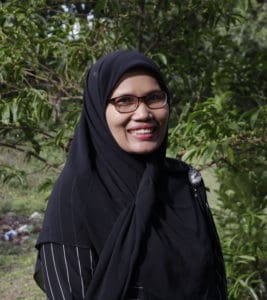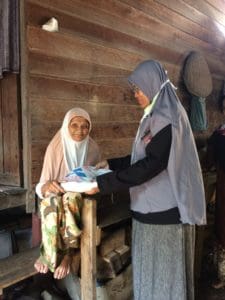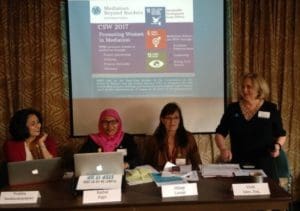Inclusion of Women in Peace Processes. Member Spotlight: Raihal Fajri
In 2008, Raihal Fajri facilitated her first mediation. Raihal managed to bring together 16 representatives from surrounding villages to negotiate with the owners of a cement factory that was polluting the air and a local river that ran through her own and neighboring villages. The initial processes lasted three months and went on day and night. At that time, she did not have the wealth of mediation knowledge that she now processes “I learned by doing. I learned along the way and did not know the theory or terminology of negotiation.” This soon changed.
IPTI Alumna
 In 2015, Raihal attended the International Peace Training Institute (IPTI) in Jakarta, Indonesia. During an intensive week of training, she recognized that she had missed some parts of the mediation process. She thoroughly enjoyed her training and was determined to apply what she had learned. Soon after, another factory was planned to be built in a nearby community. Protests erupted in Aceh, Indonesia, condemning the decision. Once again, she was called upon to use her mediation and negotiation skills, this time to facilitate peace and understanding between the police and protesting students. She used her knowledge and met with the student representative, the governor, and the police. She persuaded the governor to speak with the students and to resolve the situation within 14 days. This situation was quite different from the first one she encountered at home “In the case of the local factory, it was established for a long time, in this case, it was that the factory was to be built there since 1980. The first experience we can meet with the actor easily because the factory is there. But this is quite difficult because the factory is not built.”
In 2015, Raihal attended the International Peace Training Institute (IPTI) in Jakarta, Indonesia. During an intensive week of training, she recognized that she had missed some parts of the mediation process. She thoroughly enjoyed her training and was determined to apply what she had learned. Soon after, another factory was planned to be built in a nearby community. Protests erupted in Aceh, Indonesia, condemning the decision. Once again, she was called upon to use her mediation and negotiation skills, this time to facilitate peace and understanding between the police and protesting students. She used her knowledge and met with the student representative, the governor, and the police. She persuaded the governor to speak with the students and to resolve the situation within 14 days. This situation was quite different from the first one she encountered at home “In the case of the local factory, it was established for a long time, in this case, it was that the factory was to be built there since 1980. The first experience we can meet with the actor easily because the factory is there. But this is quite difficult because the factory is not built.”
Today, Raihal is the executive director of the Katahati Institute that focuses on good governance and democracy. Since 20 December 2014, Katahati Institute has been established Kakilangit as a civil society knowledge center in Aceh focus on best practices for civil society. This has led her to build trust with several key persons in government offices and agencies in Aceh. She has uncovered other challenges, including land use conflict, which is a big problem throughout the country, including logging of UNESCO protected areas. The government of Aceh had given permits for loggers to invest there. When Raihal and her team learned of this, they campaigned for the legislation to be changed.
 Now there is a special law that governs the protection of forests in Aceh. Civil society and access to information are crucial “It helps us to have the policy to protect the area and the key point is we want to make sure the public participate in any policymaking. Especially women.” She explained that women are excluded from official peace processes and that this is something that needs to change, “Women are supposed to show up invited after everything is signed and finished,” and often there is only one public hearing. “We are now in that process to make the participation of civil society include women mandatory, as well as to facilitate civil society to meet with a legislator from Aceh based in Jakarta.” The revising of LoGA (UUPA) process of the current legislation will start in 2021. Her organization collaborates with others in order to do this.
Now there is a special law that governs the protection of forests in Aceh. Civil society and access to information are crucial “It helps us to have the policy to protect the area and the key point is we want to make sure the public participate in any policymaking. Especially women.” She explained that women are excluded from official peace processes and that this is something that needs to change, “Women are supposed to show up invited after everything is signed and finished,” and often there is only one public hearing. “We are now in that process to make the participation of civil society include women mandatory, as well as to facilitate civil society to meet with a legislator from Aceh based in Jakarta.” The revising of LoGA (UUPA) process of the current legislation will start in 2021. Her organization collaborates with others in order to do this.
Advocacy Projects
 Raihal has recently graduated from her masters and is working on public policy advocacy projects in order to strengthen democracy in Aceh, “The aim is to strengthen civil society especially women at the grassroots level to have knowledge of their rights. We will prepare them to advocate their needs to the government.” In relation to this, her work has a knowledge center where they share best practices have articles for civil society organizations. In addition to collecting knowledge, they also consolidate and promote the work of other civil society organizations and how to navigate conflict.
Raihal has recently graduated from her masters and is working on public policy advocacy projects in order to strengthen democracy in Aceh, “The aim is to strengthen civil society especially women at the grassroots level to have knowledge of their rights. We will prepare them to advocate their needs to the government.” In relation to this, her work has a knowledge center where they share best practices have articles for civil society organizations. In addition to collecting knowledge, they also consolidate and promote the work of other civil society organizations and how to navigate conflict.
She has also written a book with the title Share for Change, the initiative of Aceh’s civil society, on how in 2000, 437 women from 20 districts came to Aceh to talk about how to enforce peace in Aceh. This was important as it was a first collection of information regarding peace process, encoded not only by men, but by women in Indonesia. Related to this, Raihal has also conducted studies on the reintegration of former female combatants since the conflict ended. This is a contentious topic as female combatants were not mentioned in any peace agreements which leaves them in a sort of limbo where they cannot claim any benefits from the government and cannot return to their homes from which they came, or inherit property that would belong to them.
Article by Kylea Shropshire, MBBI Writer
